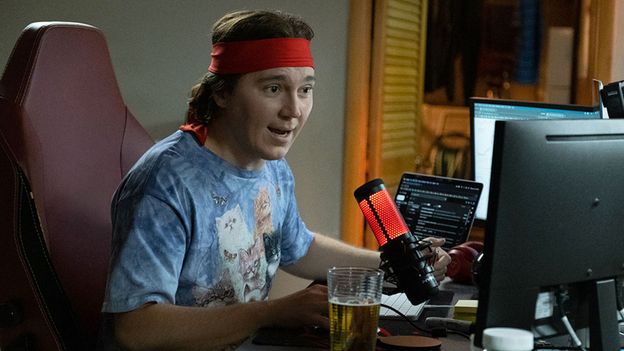
There’s a strange disconnect whenever a major Hollywood studio releases a film that seems to be about little guys beating a big, bad system. It’s a jarring undertone that Dumb Money, based on the real-life story of how small-time investors briefly thwarted Wall Street, can’t escape. Sony stands to make lots of money on the film, which mocks the rich and powerful. But it may be best not to think about that for a couple of hours and just enjoy the show.
Dumb Money is not as smart or skewering as it pretends to be – on-screen text at the end claims that Wall Street has permanently changed because of this financial blip – but it is funny, irreverent and crowd-pleasing, with a kaleidoscope of likeable characters and actors. Director Craig Gillespie (Cruella and I, Tonya) has turned a saga that ended up before a Congressional finance committee into a breezy entertainment.
More like this:
– Miyazaki’s ‘last’ film is a masterpiece
– Why Venice is mired in controversy
– Is Hollywood self-destructing?
For a few weeks in 2021, the story it tells was all over the news. At the centre is Keith Gill, played by Paul Dano with appealing modesty and geekiness. A small-time investor with a Reddit following and a YouTube channel where he goes by Roaring Kitty, he starts buying shares of GameStop, the failing brick-and-mortar gaming store. His social media followers, bored during the pandemic, take his lead. The stock price rises, their small investments soar in value, and that change causes huge losses for hedge fund managers who had been shorting the stock, betting it would keep tumbling.
As Gillespie demonstrated with I, Tonya, he has a feel for the texture of working-class lives and hopes, depicted with sympathy and not a whiff of condescension. That approach is put to good use here. The film’s title is a common term for uninformed outsiders, amateurs trying to get into the game. Gill isn’t stupid, but he is pretty powerless, a low-level financial analyst at a Massachusetts insurance company. He wears cat T-shirts and a red sweatband for his videos, produced in his basement while his patient wife (Shailene Woodley) and baby daughter are upstairs. But he is sure enough of his analysis to have bet their $53,000 life savings on GameStop.
Unlike The Big Short (2015) which focused on major players in the 2008 financial crisis, Dumb Money takes us into the lives of small investors, followers of Gill, fictional characters sharply played by the entire cast. America Ferrera is especially sympathetic as a nurse with two children, a mortgage and credit card debt. Anthony Ramos plays a GameStop employee. And the working-class Gill family could have been a movie on its own. Pete Davidson, with impeccable satiric delivery, plays Keith’s brother, who is not the smart one. He sneers that his brother’s financial success makes him think he’s Jimmy Buffett. Keith has to correct him because he means Buffett. Kate Burton and Clancy Brown make an impact in smaller roles as their parents.
Dumb Money
Director: Craig Gillespie
Cast: Paul Dano, Pete Davidson, Vincent D’Onofrio, America Ferrera, Shailene Woodley
Run time: 1hr 44m
The important part social media played in the GameStop story is not examined here so much as it is used, effectively, as a visual prop, with montages of crude Reddit comments and news clips of financial journalists. The real-life Wall Street figures, played by a starry line-up, are introduced at the start in ascending order of wealth. Seth Rogen is the hedge fund manager Gabe Plotkin.
As he wanders around his massive property, text on screen tells us his net worth is $400m. That’s impressive until we see that he is on the phone with Steven Cohen (Vincent D’Onofrio), another hedge fund manager, worth $12bn. Then comes Ken Griffin (Nick Offerman), whose investment company gives him a net worth of $16bn. The more they have, the more they have to lose. These characters are all played for comic effect, not as moustache-twirling villains. The film’s benign attitude is that they may lose billions, but they’ll be just fine.
At one point, Gill’s investment balloons to $11m, while Plotkin’s hedge fund has lost several billion. GameStop shares fell back to Earth after the trading app Robinhood, which so many of the small investors had used, restricted trading on the stock to avoid a market crash. The US Congress asked the players in the whole incident to testify about their practices, and as the film ends we see Dano, Rogen and Offerman in that Zoom testimony, intercut with real Congressional representatives. Rehearsing for the hearing, Plotkin’s media advisors have to tell him that his extensive and expensive wine collection is not the best visual backdrop. He seems befuddled. There are no real villains in this comedy of errors, just dumb and dumber money.
★★★☆☆